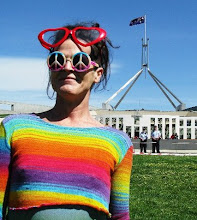Response to Evasive Stock Replies from Senators on Refugee Export Industry
Senators Fierravanti-Wells and Heffernan,
You are both deliberately avoiding the point, which is that women and children will be locked up for commiting no crime, on some desert island where church groups and other people concerned with social justice, and not just the vote of the xenophobes needed for re-electing politicians to comfortable salaries, can reach them.
Women and children, fleeing for their lives, will be taken away overseas and jailed.
Nothing you say even begins to address this.
I do not expect you to agree with me without debate, but I do expect you to be capable of engaging with the issues, and not just spew the standard government line about how many well-off immigrants your party of big business has accomodated.
You both claim to support family values, and Christian values. What the women and children arriving by boat? What about the orphans? How do you think Christ would have us treat refugees? Are you really trying to do the right thing, or just trying to safe-guard your re-election?
norrie mAy-welby
http://may-welby.blogspot.com
----------------------------------------------------------------------------------------
below is the reply I recieved from Senator Fierravanti-Wells . It is substantially the same as Heffernan's.
"Fierravanti-Wells, Concetta \(Senator\)"
24/05/2006 03:59 PM
RE: norrie on refugee export industry
Dear Ms May-Welby,
On 11 May the Government introduced the Migration Amendment (Designated Unauthorised Arrivals) Bill 2006 to Parliament. The Bill will strengthen border measures for unauthorised boat arrivals.
Australia’s approach to unauthorised arrivals will continue to reflect our strong commitment to our international protection obligations. Australia has a proud and long tradition as a resettlement destination for refugees from around the world. Australia has taken more than 660 000 refugees since 1945, and today is one of the top three resettlement countries in the world.
The amendments will widen the class of unauthorised arrivals who will be covered by the existing offshore processing arrangements. This expanded group, referred to as ‘designated unauthorised arrivals’, will include the existing group of people who arrive unauthorised at offshore entry places and persons arriving unauthorised by boat on the Australian mainland. With effect from 13 April 2006 people who arrive in Australia by sea without authority may be moved to offshore processing centres in a declared country, outside Australia, for the assessment of any asylum claims.
The arrangements ensure that people taken to offshore processing centres are safe and cared for and have access to a reliable refugee determination process. In reference to Nauru, unauthorised arrivals would be accommodated under Nauruan visas and an open centre arrangement which will enable women and children to move freely at any time during the day.
Any people found to be refugees will be provided with protection while they await resettlement in a third country, including Australia where appropriate, or plan voluntary return to their homeland.
Some 1550 people have been processed under these arrangements since 2001 and not one person found to be a refugee has been returned to their homeland against their will.
The Refugees Convention does not set down any particular process for signatory countries to use in deciding who are refugees. Australia’s offshore assessment process is modelled closely on the process used by the UNHCR and has delivered comparable outcomes on Nauru to the UNHCR process. Australia’s process has allowed a person found not to be a refugee to obtain a fresh merits review of their case by another, more senior, departmental officer.
The Convention also does not provide asylum seekers with a right to choose the country in which their claims will be assessed or where they will be provided with protection. Under the Refugees Convention it is open to a country to make different arrangements to address its refugee protection obligations for people on the basis of whether their entry to the country was lawful or unlawful. The Convention itself contains different provisions for dealing with refugees depending on whether their entry to, or presence in, a country is lawful.
People found to be refugees under the offshore process will remain offshore in safety until resettlement to a third country is arranged.
Yours sincerely,
Concetta Fierravanti-Wells
Liberal Senator for New South Wales
You are both deliberately avoiding the point, which is that women and children will be locked up for commiting no crime, on some desert island where church groups and other people concerned with social justice, and not just the vote of the xenophobes needed for re-electing politicians to comfortable salaries, can reach them.
Women and children, fleeing for their lives, will be taken away overseas and jailed.
Nothing you say even begins to address this.
I do not expect you to agree with me without debate, but I do expect you to be capable of engaging with the issues, and not just spew the standard government line about how many well-off immigrants your party of big business has accomodated.
You both claim to support family values, and Christian values. What the women and children arriving by boat? What about the orphans? How do you think Christ would have us treat refugees? Are you really trying to do the right thing, or just trying to safe-guard your re-election?
norrie mAy-welby
http://may-welby.blogspot.com
----------------------------------------------------------------------------------------
below is the reply I recieved from Senator Fierravanti-Wells . It is substantially the same as Heffernan's.
"Fierravanti-Wells, Concetta \(Senator\)"
24/05/2006 03:59 PM
RE: norrie on refugee export industry
Dear Ms May-Welby,
On 11 May the Government introduced the Migration Amendment (Designated Unauthorised Arrivals) Bill 2006 to Parliament. The Bill will strengthen border measures for unauthorised boat arrivals.
Australia’s approach to unauthorised arrivals will continue to reflect our strong commitment to our international protection obligations. Australia has a proud and long tradition as a resettlement destination for refugees from around the world. Australia has taken more than 660 000 refugees since 1945, and today is one of the top three resettlement countries in the world.
The amendments will widen the class of unauthorised arrivals who will be covered by the existing offshore processing arrangements. This expanded group, referred to as ‘designated unauthorised arrivals’, will include the existing group of people who arrive unauthorised at offshore entry places and persons arriving unauthorised by boat on the Australian mainland. With effect from 13 April 2006 people who arrive in Australia by sea without authority may be moved to offshore processing centres in a declared country, outside Australia, for the assessment of any asylum claims.
The arrangements ensure that people taken to offshore processing centres are safe and cared for and have access to a reliable refugee determination process. In reference to Nauru, unauthorised arrivals would be accommodated under Nauruan visas and an open centre arrangement which will enable women and children to move freely at any time during the day.
Any people found to be refugees will be provided with protection while they await resettlement in a third country, including Australia where appropriate, or plan voluntary return to their homeland.
Some 1550 people have been processed under these arrangements since 2001 and not one person found to be a refugee has been returned to their homeland against their will.
The Refugees Convention does not set down any particular process for signatory countries to use in deciding who are refugees. Australia’s offshore assessment process is modelled closely on the process used by the UNHCR and has delivered comparable outcomes on Nauru to the UNHCR process. Australia’s process has allowed a person found not to be a refugee to obtain a fresh merits review of their case by another, more senior, departmental officer.
The Convention also does not provide asylum seekers with a right to choose the country in which their claims will be assessed or where they will be provided with protection. Under the Refugees Convention it is open to a country to make different arrangements to address its refugee protection obligations for people on the basis of whether their entry to the country was lawful or unlawful. The Convention itself contains different provisions for dealing with refugees depending on whether their entry to, or presence in, a country is lawful.
People found to be refugees under the offshore process will remain offshore in safety until resettlement to a third country is arranged.
Yours sincerely,
Concetta Fierravanti-Wells
Liberal Senator for New South Wales



0 Comments:
Post a Comment
<< Home